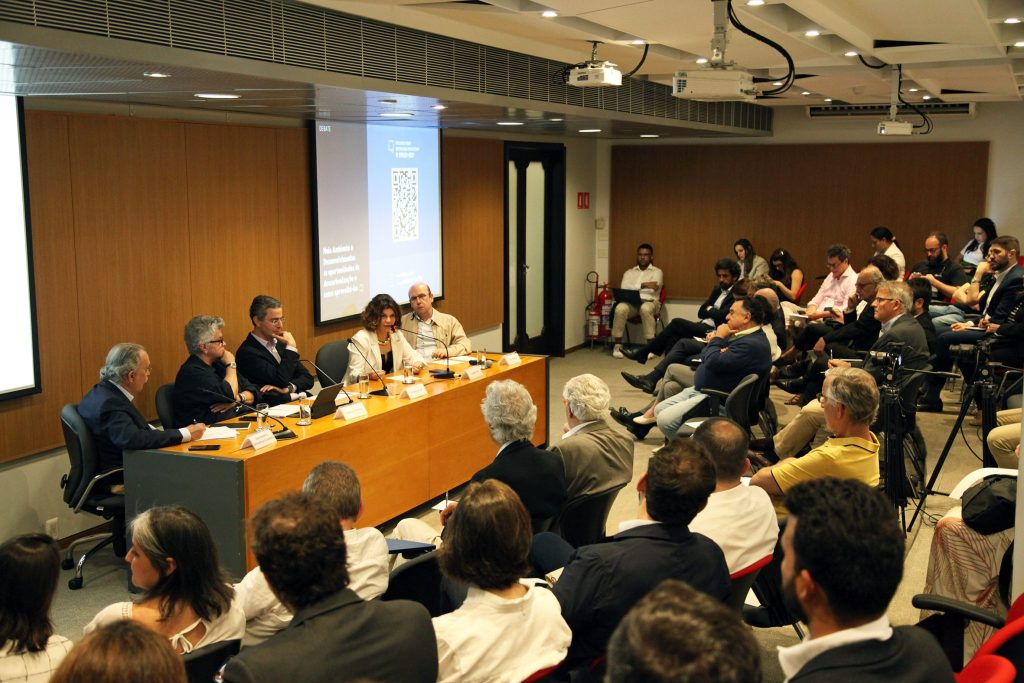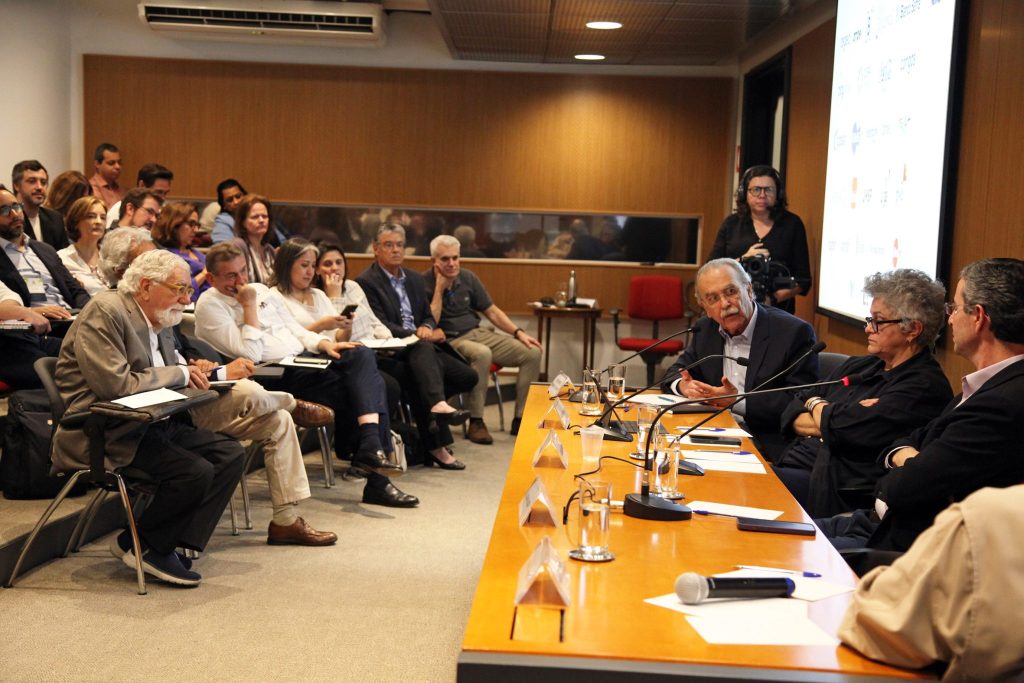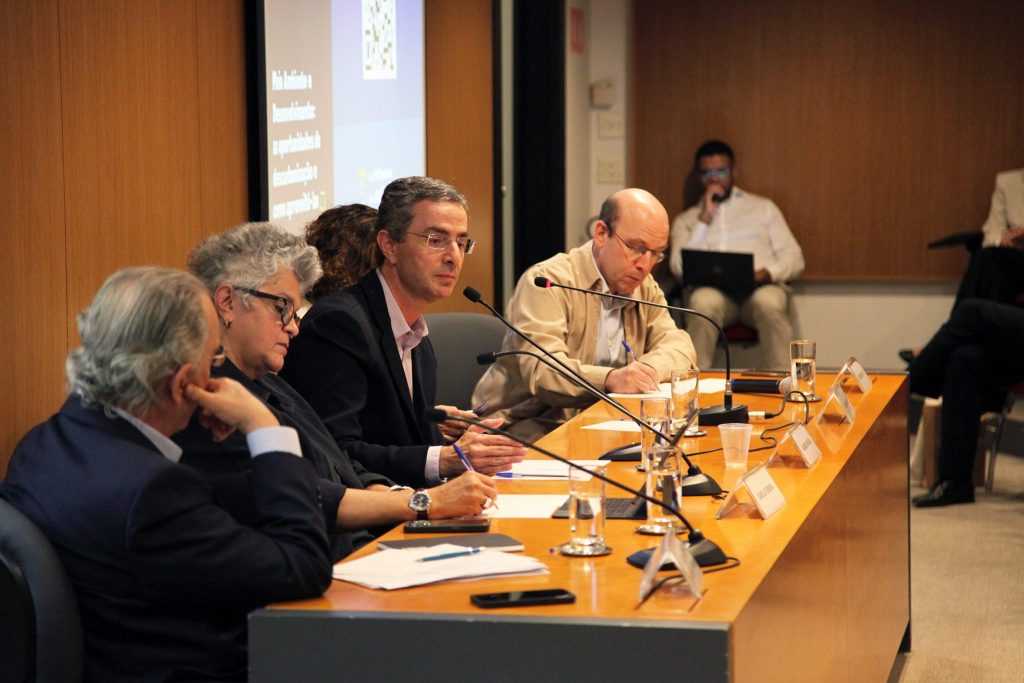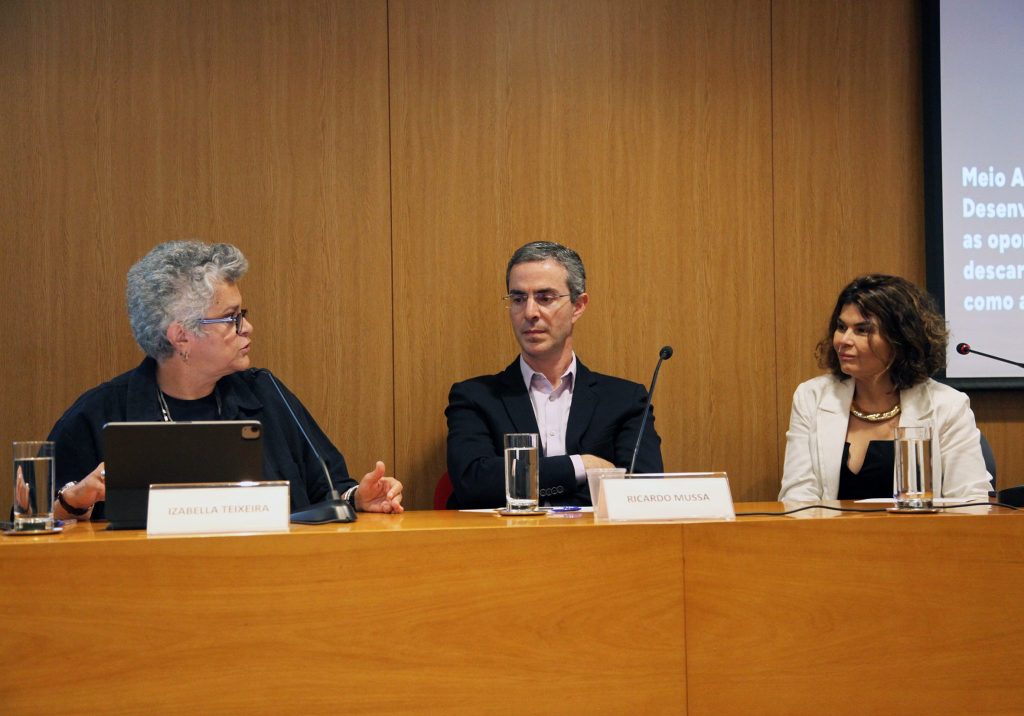Environment and Development: Seizing the opportunities of decarbonization
The debate kicked off a series of meetings on the environment and development, through which the Fundação FHC aims to contribute to preparations for COP-30, set to be held in Belém in November 2025.
Brazil’s climate transition comes with its own unique challenges and specific characteristics, presenting dilemmas different from those faced by other countries. The nation must resist importing problems that aren’t relevant to its context or copying models and solutions that don’t align with its needs.
To fully realize its potential as a global leader in this critical process, the government at all levels, the legislature, the private sector, universities, science and technology centers, and civil society must engage in deeper discussions about a future where development and sustainability are intertwined. Achieving this vision will require moving beyond the current polarization surrounding environmental issues.
These were the key takeaways from the debate that kicked off a series of meetings on the environment and development, through which the Fundação FHC aims to contribute to preparations for the United Nations Conference on Climate Change (COP-30), set to be held in Belém in November 2025.

“We must address climate, energy, mineral, and agricultural security—key aspects of the transition that demand commitment from both the public and private sectors, as well as from society at large,” said Izabella Teixeira, former Minister of the Environment and advisor to the Fundação FHC. “It is essential for Brazil to engage in a broad, integrated discussion about its future in a world facing extreme challenges—it’s unavoidable. This conversation must rise above political and ideological polarization.”
Ms. Teixeira emphasized the need to tackle two parallel challenges: mitigating the impacts of global warming, which are already part of everyday life in Brazil and across the globe, and implementing decarbonization initiatives in various industries. “Brazil must move beyond environmental guesswork and engage in serious discussions about how environmental issues affect economic sectors, placing them at the center of investment decisions,” she stressed.
Economist and consultant Mr. José Roberto Mendonça de Barros highlighted that Brazil’s current budgetary constraints make it unrealistic to expect the climate transition to be financed primarily through Treasury funds or subsidies. “A well-developed, efficient carbon credit market is crucial for financing major projects like large-scale green hydrogen production or offshore renewable energy plants. The international carbon credit market should play a role in funding Brazil’s transition in exchange for preserving the Amazon. Unfortunately, this isn’t on the immediate horizon,” he explained.
Mr. Mendonça de Barros, founder of MB Associados, noted that while Brazil has made steady progress in decarbonizing important production processes, such as green cement, the country still faces two significant challenges. The first is the contradiction of being both a “member of OPEC” (Organization of Petroleum Exporting Countries) and the host of COP-30. The second is the lack of direction in energy sector governance, as Brazil’s energy matrix increasingly relies on renewables, yet energy costs for consumers remain high.

“Brazil has been undergoing an energy transition for several decades, and if the world were in the same position as Brazil today, we wouldn’t be discussing global warming in the same terms. The Brazilian energy sector is responsible for only 18% of the country’s carbon emissions, whereas globally, this figure stands between 65% and 70%. We shouldn’t import problems that aren’t ours,” said Luciana Costa, director of Infrastructure, Energy Transition, and Climate Change at the BNDES.
Ms. Costa emphasized that Brazil must “closely examine” projects in key areas such as freight railroads, urban mobility (including electric and hybrid buses), and basic sanitation to further reduce its carbon footprint and protect the environment. “Brazil entered the transition with significant gaps in infrastructure, logistics, public transportation, and sanitation—areas with huge decarbonization potential. In 2023, the BNDES allocated R$70 billion to projects in these sectors,” she said.
“There’s no doubt that Brazil is on the side of solving climate change challenges, but we need proper legislation and public policies to attract more foreign investment and ensure the viability of decarbonization projects. Brazil also has a branding issue; few know about our positive contributions, while our negative aspects are widely publicized and harm our global image,” said Ricardo Mussa, CEO of Raízen, a Brazilian renewable energy company.
Mr. Mussa stressed the importance of stable regulations in the energy sector, pointing to the RenovaBio program, launched in 2017, as a prime example. RenovaBio was designed to expand the production and use of biofuels in Brazil’s energy matrix by setting annual national decarbonization targets for the fuel sector and facilitating the trading of Decarbonization Credits (CBIOs).
“RenovaBio is a highly sophisticated carbon market that regulates itself based on the supply of renewable fuels, with CBIO purchases serving as an innovative tool to develop this market. However, good governance and predictability are required for the program to succeed. If the government changes the annual targets, as it did in 2022 before the presidential elections, it undermines RenovaBio’s credibility and governance,” he explained.
The climate transition involves shifting away from an economic model based on fossil fuels (oil, gas, and coal), which drive large-scale greenhouse gas emissions and contribute to global warming. The goal is to move toward a model that prioritizes renewable energy sources and more efficient production processes to combat climate change.

Oil exploration in Brazil’s Equatorial Margin sparks division amongst speakers
Mr. Mendonça de Barros sees a clear contradiction in Brazil’s pursuit of becoming a global leader in climate transition while remaining an exporter of oil, a major contributor to global warming. “Brazil is both a member of OPEC and the host of COP-30; there’s an inconsistency here. We are now in the middle of a debate on whether or not to explore for oil in the Atlantic Ocean near the mouth of the Amazon River. I’m not saying it shouldn’t be done, but if we open this door, oil could overshadow everything else and jeopardize Brazil’s entire climate transition project,” warned the economist.
However, Ms. Costa, director of the BNDES, argued that “Oil exploration in the pre-salt layer has proven to be efficient in terms of carbon emissions, and this model could be applied to the Equatorial Margin—an extensive area of the Atlantic Ocean stretching from Amapá to Rio Grande do Norte that could hold significant oil and gas reserves. Only exploratory research can determine whether it’s worth pursuing oil extraction in this region.” She further noted, “This must be a technical decision, taking into account all safety considerations.”
Ms. Costa also pointed out that pre-salt oil exploration will begin to decline over the next decade, and if new reserves are not developed, Brazil risks losing its status as an oil exporter, which has been a major achievement in recent years. “I support authorizing exploratory research in the Equatorial Margin to assess the size of the reserves and the conditions for extraction. With that data, Brazilian society can then decide how to proceed. Without this research, there’s no way to make an informed decision,” she said.
Echoing this sentiment, Mr. Henri Philippe Reichstul, former chairman of Petrobras (1999–2001), argued that Brazil must explore its potential. “We need to drill and see what’s there. Brazil cannot afford to ignore a resource that could drive exports, boost domestic production, generate tax revenues and royalties, and help fund essential public services like education and health,” he stressed.
“It is essential for Brazil to engage in a broad, integrated discussion about its future in a world facing extreme challenges—it’s unavoidable. This conversation must rise above political and ideological polarization,” said Izabella Teixeira, former Minister of the Environment.
Mr. Reichstul, who was not seated at the debate table but requested to speak, highlighted that Petrobras operates with exceptionally high safety standards in its offshore operations along the coasts of Rio de Janeiro, Espírito Santo, and São Paulo, where significant oil reserves, including those in the pre-salt layer, are located. “In several decades of maritime exploration, over 15,000 wells have been drilled without any leaks. Tens of thousands of Petrobras employees are transported to the platforms every year, and we have never had a helicopter crash. Extracting oil and gas from the seabed is a highly technical operation, and Petrobras is a global leader in this field,” he stated.
The former Petrobras CEO also pointed to Norway, one of the world’s wealthiest nations, which has built much of its socio-economic development on North Sea oil exploration since the 1970s while also becoming a leader in renewable energy. “The Norwegians have effectively resolved this supposed contradiction. Brazil can do the same. In fact, we have already made significant strides in our energy transition, with the construction of large hydroelectric dams, the ethanol program in the last century, and more recently, advancements in wind and solar energy,” he concluded.

Photo: Vinicius Doti
Amazon deforestation is a crime to be fought, but it must not stall progress
Ms. Teixeira emphasized that while land use—primarily illegal deforestation in the Amazon—has long been seen as the main culprit in Brazil’s carbon emissions, it should no longer dominate the climate agenda as it has been. “This is an issue from a bygone era. A little over a decade ago, Brazil was on the verge of addressing it, but in recent years, illegal deforestation has worsened, partly because society has been complicit in the destruction of the forest,” she noted.
“The destruction of the Amazon by timber smugglers, land grabbers, and illegal miners is a crime that must be fought with full force. However, it should not paralyze or derail the broader climate transition agenda, which now includes strategic topics such as political economy, geopolitics, and emerging digital technologies,” said the former environment minister.
“The political, economic, and geopolitical conditions that enabled events like the Rio 92 Summit and the Paris Agreement (2015) have changed. We now live in a fragmented and fast-evolving world, one that will no longer be dominated by the West. Climate governance is no longer solely the domain of nation-states; it is constantly evolving and requires a new way of thinking, acting, and negotiating. Brazil needs to engage meaningfully in this debate based on new premises, or it will find itself being led from the outside in,” explained Ms. Teixeira.
Otávio Dias is the content editor at the Fundação FHC. He is a political and international affairs journalist, a former correspondent for Folha de São Paulo in London, and former editor of the estadao.com.br website.
Translation: Todd Harkin, Harkin Translations






























